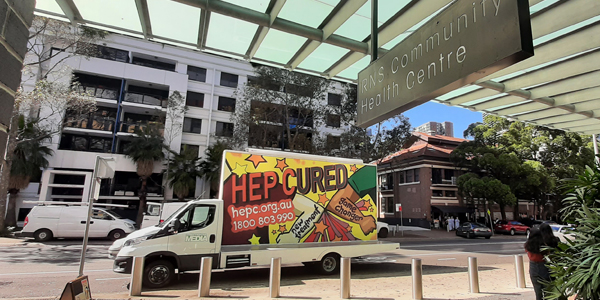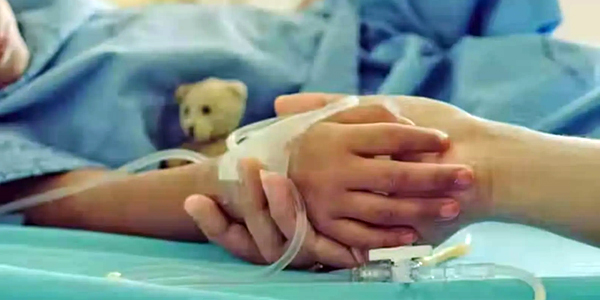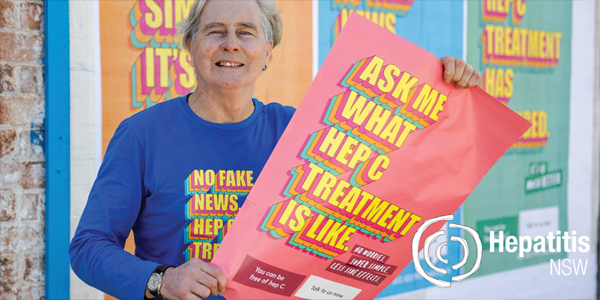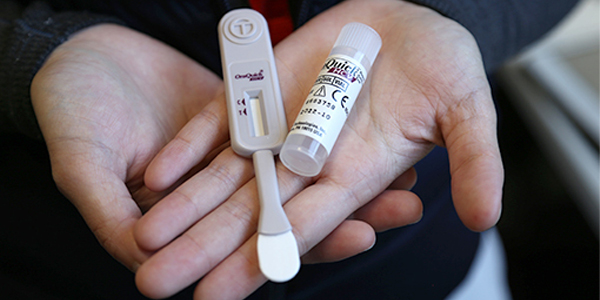The Champion #106 – May 2022
This issue:
- HEP CURED Mobile Mural’s victory lap for World Liver Day!
- Acute, severe hepatitis of unknown origin in children
- New paper on peer‑facilitated treatment access for hep C published
- A QuickStart to treatment for hep C

HEP CURED Mobile Mural’s victory lap for World Liver Day!

Following a successful road trip throughout New South Wales during March, with many stops and events on the way, the HEP CURED Mobile Mural wasn’t ready to call it quits. Even after it rolled out of its final campaign stop on March 24 in Surry Hills there was another trip to come! April 19 and 20 saw the return of the mural as it rolled through the streets of Sydney and suburbs heading south, west and north around the greater Sydney area.
April 19 marks World Liver Day 2022 – an event to raise awareness of liver health and how we can nourish and support this incredibly important organ in our bodies. More than six million Australians are affected by liver disease with, sadly, several thousand dying each year from chronic liver disease. Viral hepatitis – hep B and hep C – contribute significantly to poor liver health so it is important to mark this day.
Although World Liver Day isn’t as high profile as World Hepatitis Day there is a need to provide a focus for liver related issues and the HEP CURED Mobile Mural was an ideal way to do this… and add a splash of colour to Sydney traffic and surrounds in the process.
Rolling through Hurstville and Bankstown on Tuesday April 19, the mural parked in the main shopping areas of Liverpool and then St Marys. Next stop was outside the Liverpool Hep C Clinic and then Nepean Hospital with a loop around UWS Nepean for some extra exposure where students were gathered. Blacktown Hospital was followed by Cabramatta, with several loops up and down its main street. A visit to the professional areas of Kogarah and the Kogarah shopping strip wrapped a productive first day.
Chatswood and Newtown, where there was a lot of foot traffic, were featured locations on Wednesday April 20. Lane Cove and The Corso at Manly, the Langton Centre in Surry Hills and outside the RNS Community Health Centre in St Leonards (pictured), all received visits. The Balgowlah shops, Glebe Point Rd, and Oxford St Darlinghurst – with lots of traffic and school holiday pedestrians – ensured great visual exposure to the HEP CURED message.
In addition to testing and treating, where necessary, for hep B and hep C, people can look after their livers by: eating well (maintaining a balanced diet while limiting saturated fats, sugar, salt and oil); limiting alcohol consumption, and; getting active. Our livers are important for our survival and wellbeing, by keeping them healthy, we keep ourselves healthy.
Will the HEP CURED Mobile Mural be making any future appearances? More info and news as it comes to hand!
- Read our page on YOUR LIVER HEALTH >>>CLICK HERE
- For more on HEP CURED>>>CLICK HERE
Acute, severe hepatitis of unknown origin in children

Recent Australian media articles have cited reports from international sources (including the World Health Organization (WHO)) of cases of severe hepatitis (inflammation of the liver) of unknown origin in children.
As of 21 April 2022, there were 169 known cases across 11 countries with one death and 17 children requiring a liver transplant. The children:
- Are aged one month to 16 years.
- Presented with symptoms including diarrhoea, nausea and abdominal pain, followed by the onset of jaundice (yellowing of the skin and eyes).
The WHO advises that further investigations are ongoing and affected countries have initiated enhanced surveillance activities.
Hepatitis Australia and GESA (the Gastroenterological Society of Australia – the peak membership organisation for Australian healthcare professionals and researchers working in the fields of gastroenterology and hepatology) have worked together to provide information and advice on outbreak. GESA has also released a media statement.
Key Briefing Messages
- Contact your health professional without delay if you are concerned about your child’s health.
- This is a very rare occurrence globally.
- Each year in Australia a small number of children present with an unexplained hepatitis, some requiring a liver transplant. GESA has not seen an unusual spike in cases here, but surveillance continues.
- There is no known link to the COVID-19 vaccine. It is not known if there is a link to COVID-19.
- There is no link to hepatitis A, B, C, D or E.
- Practice thorough hand washing (including supervising children).
- Cover your mouth and nose when coughing or sneezing.
Hepatitis NSW will provide any further updates as they become available.
- To read the full Hepatitis Australia Briefing >>>CLICK HERE
- To read the GESA Media Statement >>>CLICK HERE
New paper on peer‑facilitated treatment access for hep C published

A paper outlining the impact of peer workers assistance in helping members of the community to access hep C testing and treatment has been published in the Harm Reduction Journal (a highly regarded, peer-reviewed, online medical journal). The paper – “Peer-facilitated treatment access for hepatitis C: the Live Hep C Free project” – details the lessons from the implementation of the Hepatitis NSW Live Hep C Free project – our peer-facilitated hep C testing and treatment program – and its contribution to micro-elimination efforts.
Describing how Live Hep C Free aims to improve access to on-the-spot hep C testing, treatment, and care in priority settings, the paper outlines how this is achieved through partnerships between peer workers and clinical nurses. Since the start of the Live Hep C Free in January 2018 (up until the submission of the paper), 4,515 people had been engaged about hep C and encouraged to access on-site hep C health care, and over 1,000 people were screened for hep C and liver health. Almost 250 people had accessed hep C treatment through the project.
The process of writing, submission, approval and publication can take some time, so the figures cited in the paper are now dated, and Live Hep C Free has since gone from strength to strength, with even higher numbers of engagement.
It is hoped the information in the paper will further discussion about incorporating peer-centred hep C health programs into other priority sites. Hep C care-delivery models such as Live Hep C Free can continue to contribute to micro-elimination of the virus in key settings by increasing treatment uptake in high prevalence communities, while supporting progress toward national elimination targets.
The paper concludes that the Live Hep C Free project has been able to highlight the benefits of incorporating trustworthy, efficient, and convenient peer-centred health services to engage and support vulnerable populations through hep C testing and treatment. This applies particularly to individuals who have historically been disconnected from the health care system. Additionally, it noted that ongoing funding support to sustain the project and deliver at scale were essential.
The paper was co-written by Professor Carla Treloar (Director, Centre for Social Research in Health (CSRH) and the Social Policy Research Centre), Julia Silano, (CSRH), and, from Hepatitis NSW, Kyle Leadbeatter, Sandy Davidson, and Justine (JD) Doidge.
Access article via:
- Harm Reduction Journal >>>CLICK HERE
- PubMed/National Library of Medicine >>>CLICK HERE
- Research Gate >>>CLICK HERE
A QuickStart to treatment for hep C

A new Burnet Institute hepatitis C project, QuickStart – to simplify testing and treatment through the use of rapid antibody tests – is undertaking a national trial through high prevalence clinics.
QuickStart is described by Associate Professor Joe Doyle – Burnet Institute Co-Head of Viral Hepatitis Elimination – as a potential gamechanger that will get people started on treatment earlier based on their risks rather than making them wait for test results. Dried Blood Spot testing and point-of-care testing in NSW already do similar, however this study is taking the approach Australia-wide.
It is also hoped that rapid anti-body testing will ultimately have a big impact in low- and middle-income countries with the process replacing more expensive laboratory tests.
The study will evaluate the effectiveness of a test-and-treat approach where, if the patient tests positive to hep C using the rapid test (which provides a result in 20 minutes from a finger prick of blood), they can be placed immediately on treatment instead of having to wait for confirmation from PCR tests in the laboratory.
Professor Doyle said participation in the study is best suited to health clinics, needle and syringe programs, and drug and alcohol services with a high proportion of patients at risk from hep C, including people who inject drugs. QuickStart takes a patient-centred approach with the potential to change the hepatitis C treatment landscape, “This study could change the paradigm away from expensive tests and confirming disease into treating people based on their risks and getting them started on treatment earlier rather than later.”
Rapid testing can help at-risk people who may never have considered that they have hep C, and people who may have tested negative previously but has since unknowingly become reinfected. While 90,000 Australians have been treated for hep C with effective direct-acting antivirals since 2016, an estimated 120,000 remain undiagnosed and at risk of significant hep C related liver disease.
- Full Burnett Institute article >>> CLICK HERE






